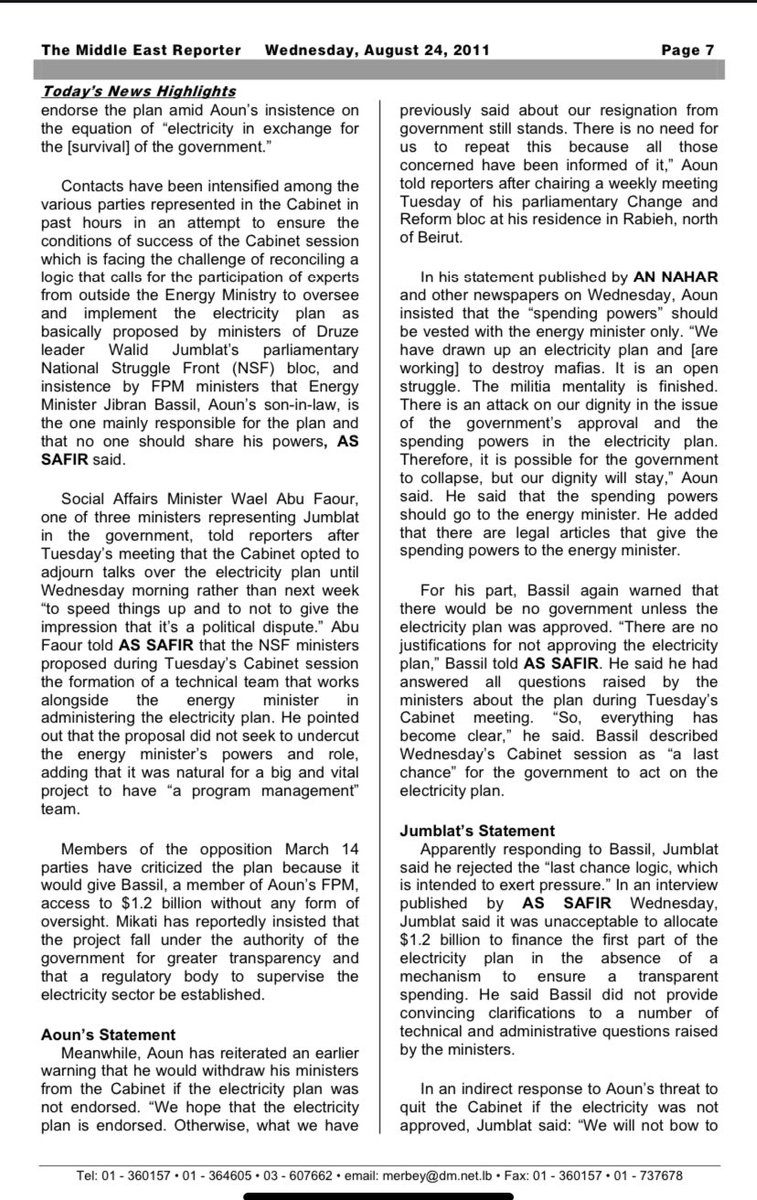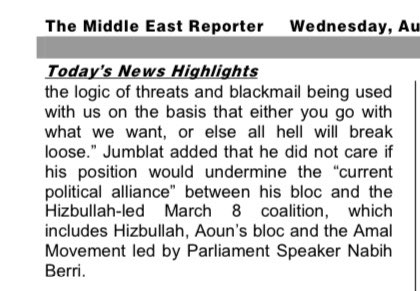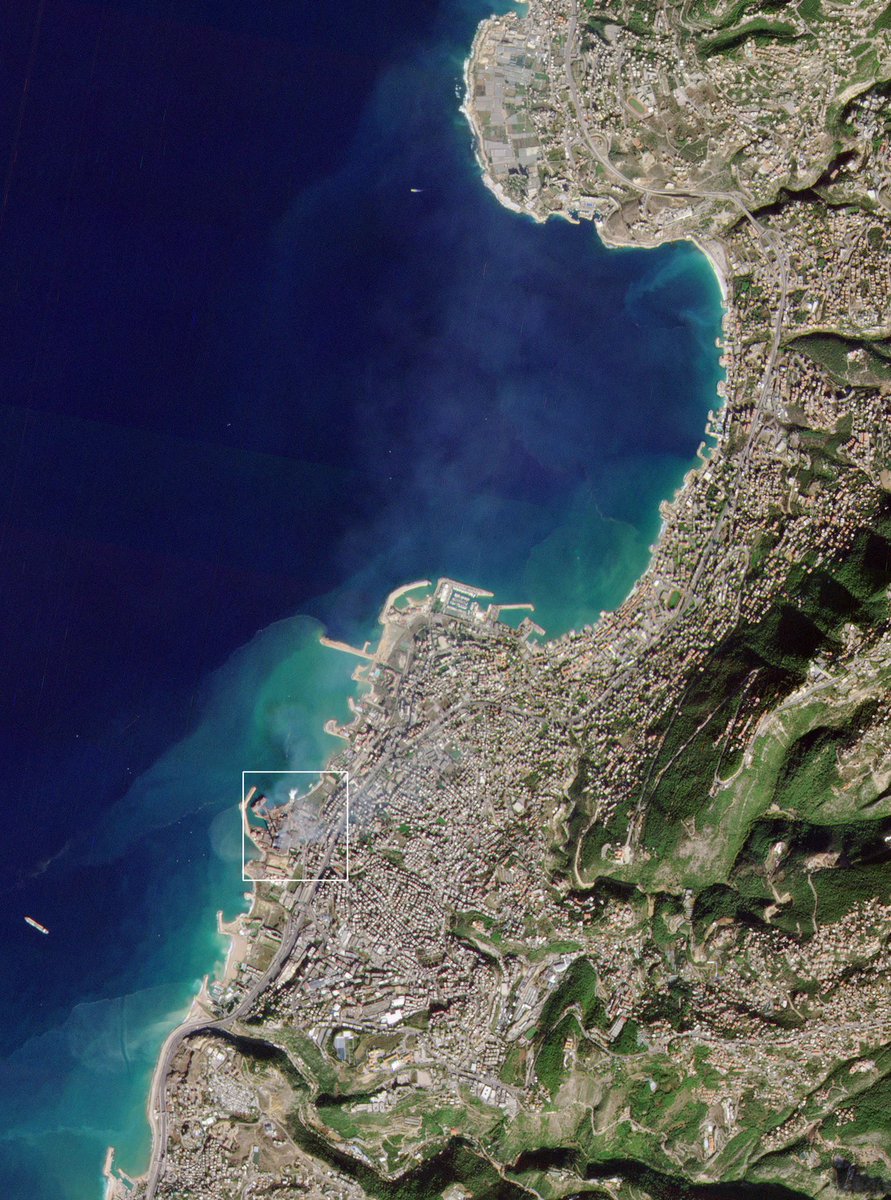After weeks in the works, here it is: How One Power Plant Reveals the Risks of Using Iraqi Fuel Oil in Lebanon, @EnergyFuse. My piece is based on solid data, @Kpler @MarineTraffic shipping data& @planetlabs satellite images. https://bit.ly/2MnSnWA #Lebanon #Iraq
Thread below:
Thread below:
1) Lebanese govts have had various opportunities to switch to cleaner fuels for power,& cut expenditures. A plethora of reports were published on this subject. The outcome, however, was political bickering because of the nature of the system in place since the 1990s. #Lebanon
2) In August 2011, when I was working for the Middle East Reporter (MER) newsletter with its editor veteran journalist Toufic Mishlawi, we scanned local papers to see how the electricity crisis was covered. Below was the #Lebanon govt-manner of discussing an electricity plan:
3) It's a system that can hardly allow action to be taken on critical matters, because of the pool of rival parties. The main ones are led by warlords responsible for the destruction of the country between 1975-1990. To reform means shooting themselves in the foot.
4) Back in *2008* a World Bank report-- "electricity sector public expenditure review"-- offered suggestions for cutting spending. One was a revision of the fuel specifications on heavy fuel oil from 1%to 3.5% after studying the impact on environment&health. #Lebanon
5) Such a revision and according to the WB could have brought millions of dollars in annual savings by 2008. All the info in the article with the sources. https://bit.ly/2MnSnWA
6) HFO with restrictive 1% percent S content was more expensive than the 3.5%& had a limited supplier market. Many "white papers" were wasted later trying to advise the govts running the country on how to manage this sector that never changed.
7) Successive govts never wanted to change the status quo. One proof lies in the testimonies from laboratory workers who were questioned last year over the case of a tainted fuel oil shipment.
8)Those lab employees falsified fuel specs reports,manipulated characteristics of imported HFO (as well as other products) to make it appear compliant with standards (ex: sulfur, viscosity). Dangerous actions were committed. Shadowy intermediaries showered them with money/gifts.
9) Born into this system during the civil war, we later grew up thinking these were a normal way of living:
10) A normal way of living: to learn at a young age how to load Mazut (low quality fuel oil) into the family's generator to turn it on when the power provided by the govt-owned facilities was unavailable.
11)To race with your siblings to unplug the refrigerator, water heater, and other appliances because these cannot operate while the generator is running. To drag your feet back to the dead generator to turn it back on because you forgot to unplug the refrigerator earlier.
12) A normal life: the old #Zouk power plant and its infamous smoke stacks we used to drive by as kids, wondering about those cylindrical shapes. This plant has impacted the environment and health of residents in Zouk Mikael: #Lebanon
13) I reviewed documents, data, and statements from people in Zouk Mikael to better understand the impact of this power plant which along with the ageing Jiyeh plant run on heavy fuel oil (HFO). https://bit.ly/2MnSnWA Below is a summary:
14) One local report in 2018 called the plant's two stacks “symbols of death” due to the hazardous air pollutants they have been emitting for decades in an area with a high population density.
15) The Zouk power plant (along with Jiyeh) were supposed to be decommissioned a long time ago. One govt policy paper says they were supposed to be withdrawn from service starting in 2020.
16) The old Zouk power plant remains standing, despite its low efficiency and high operating costs. It's among many of the world’s hotspots for the emission of sulfur dioxide (SO2), according to a report published by Greenpeace in 2019.
17) I spoke to Dr. @najat_saliba , a professor of analytical chemistry at AUB who has researched the role of the Zouk power plant in contributing to levels of environmental pollutants in the ambient atmosphere:
18) "It [the Zouk power plant] is dangerous because it releases high amounts of SO2 and high amounts of cancerous polycyclic hydrocarbons among many other chemicals,” Dr. @najat_saliba told me. https://bit.ly/2MnSnWA
19) #Iraq fuel oil is characterized by a high sulfur content (~4%). I highlighted this in previous threads and articles. This is what it means:
20) Residual fuel oil represents the *bottom of the barrel* that remains after crude oil is processed into valuable products. When it is burned at power plants located in residential areas, it releases toxic emissions such as sulfur dioxide (SO2).
21) If these plants are still operating despite their dilapidated condition, while being poorly maintained, the impact of this type of fuel oil would cause further deterioration. Such is the case with the Zouk power plant which runs on HFO. #Lebanon
22) A rise in respiratory problems in Zouk Mikael has been blamed on the plant, and this situation has been going on since the early 1990s. Sat image below from @planetlabs showing the Zouk plant and the dispersion of its emissions on Nov 16,2020.
23) I also discussed this issue with @detoxconflict which used the TROPOspheric Monitoring Instrument (satellite instrument on board the Copernicus Sentinel-5 Precursor satellite) to help understand the wintertime pollution near the Zouk plant, here: https://bit.ly/2MnSnWA
24) The govt's attempt now to run dilapidated power plants such as Zouk on cut-rate fuel oil, as part of its stopgap solutions, will lead to more particulate emissions, & will inflict further damage on equipment if used for a long period. @HarryIstepanian @yahya_mawloud
25) #Iraq has a surplus of high sulfur fuel oil due to the configuration of its refineries. This challenge grew further with the introduction on January 1, 2020 of IMO 2020, a global regulation limiting the sulfur content of fuel oil used in ships from 3.50% to 0.50%.
26) Lebanon, in its turn, does not have any refining capacity, and is completely dependent on fuel oil and oil products imports. The rust-covered Zahrani refinery is long gone,& to read that Lebanese delegation in Baghdad in Dec seriously thought of using it, that was shocking.
27) Information on the Zahrani refinery (that used to produce ~ 17kbpd) in the article along with a recent satellite image from @planetlabs .
28) So far, oil tankers continue to head to #Lebanon laden with dirty and clean petroleum products, based on data from @Kpler and @MarineTraffic . Among the latest ships was a tanker from Kuwait that arrived at Zahrani terminal on Jan23.
29) The country should not "go dark" because the fuel is still available. I wrote about it last year, here: https://bit.ly/3rcHfKG
And here's an old thread: https://twitter.com/NoamRaydan/status/1340959475923087361?s=20
And here's an old thread: https://twitter.com/NoamRaydan/status/1340959475923087361?s=20
30) For over two decades, the power sector has been run by the same archaic and ruinous policies. What's happening now is not the result of the financial crisis, but these very disastrous policies.
31) To persist now in purchasing cheap residual fuel oil—which is high in sulfur content—for power generation, implies a continuation of the state’s crippling approach to an electricity sector plagued by mismanagement since the early 1990s. #Lebanon

 Read on Twitter
Read on Twitter





